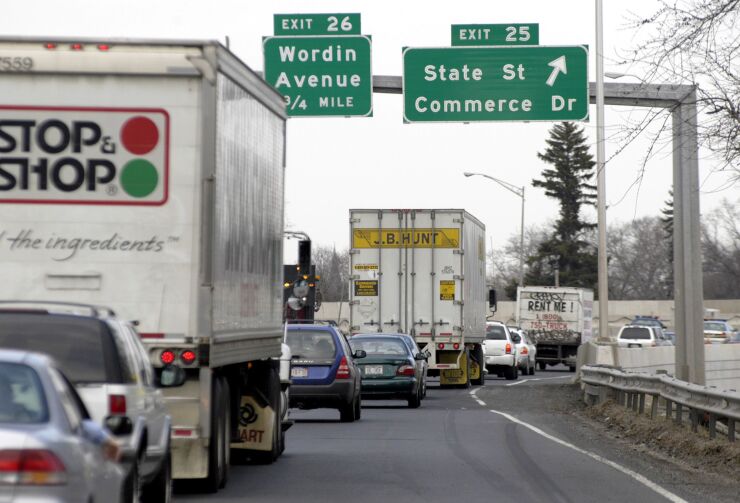A judge’s ruling that a lawsuit against Rhode Island’s trucks-only tolling system can proceed in federal court has not deterred Connecticut Gov. Ned Lamont's call for a similar mechanism.
“I am asking the legislature to act on our consensus proposal to follow Rhode Island in implementing commercial truck tolls on 12 bridges meeting strict federal criteria,” Lamont said Friday in a letter to top lawmakers, in which he announced a $19.4 billion transportation infrastructure proposal.
While less than the $21 billion he asked for last month, Lamont said the amount could increase if the state’s rainy-day fund balance exceeds 15%.

Lamont, whose state is politically gridlocked over how to pay for its crumbling roads and bridges and sketchy mass transit, has asked the legislature to convene a special session in mid-December to deal with the problem.
“I believe our constituents deserve action on this proposal in short order,” he said.
Lamont, a Democrat elected last year, favored trucks-only tolls while campaigning before backpedaling. Now, with even his own party at an impasse over how to fund last month’s so-called
On Thursday, the U.S. Court of Appeals for the First Circuit ruled that the Tax Injunction Act, which Congress enacted in 1937 and which restricts the power of federal district courts to prevent the collection or enforcement of state taxes, does not nullify the lawsuit several groups filed against Rhode Island.
“When we look at whether the word ‘tax’ was then understood to include tolls, we find something of a mixed bag, albeit one quite heavily loaded in favor of treating tolls as something other than taxes,” Judge William Kayatta wrote.
Gov. Gina Raimondo and lawmakers passed truck tolling in 2016 along with the governor’s $4.7 billion RhodeWorks infrastructure projects program.
“I am asking the legislature to act on our consensus proposal to follow Rhode Island in implementing commercial truck tolls on 12 bridges meeting strict federal criteria. I am confident that the legal arguments for truck tolls will prevail,” Lamont said Friday.
On March 28, nine days after the U.S. District Court in Rhode Island dismissed the lawsuit, trucking groups appealed.
The American Trucking Associations, Cumberland Farms Inc. and M&M Transport Services Inc. filed the initial appeal. New England Motor Freight also was part of the lawsuit but has since declared Chapter 11 bankruptcy protection and shuttered its operations. They said the tolls were unconstitutionally discriminatory against out-of-state entities under the dormant Commerce Clause.
“We have long believed that Rhode Island’s RhodeWorks truck-only toll scheme was a violation of the Constitution and an attempt to use our industry as a piggy bank,” said ATA president and chief executive Chris Spear.

Connecticut Republicans remain opposed to tolls. Senate Minority Leader Len Fasano, R-North Haven, said Lamont is putting the state at legal risk.
“There’s no question that the truckers can sue the state of Connecticut and they will sue the state of Connecticut," he said.
Republicans have proposed an alternative funding plan, called
It would eliminate all bonding through the special tax obligation credit after 2022; back federal low interest loans with a stabilized Special Transportation Fund; and re-establish the Transportation Strategy Board and establish a Connecticut-New York Railroad Strategy Board.
New Haven mayor-elect Justin Elicker strongly favors highway tolling. “I’m a vocal supporter of tolls,” said Elicker, who will take office next month. “We’re losing a revenue opportunity from thousands of vehicles traveling through our state.”
Lamont also wants lawmakers to vote by year’s end on the annual bond package of construction projects, and a settlement of a long-running lawsuit against the state by hospitals.





